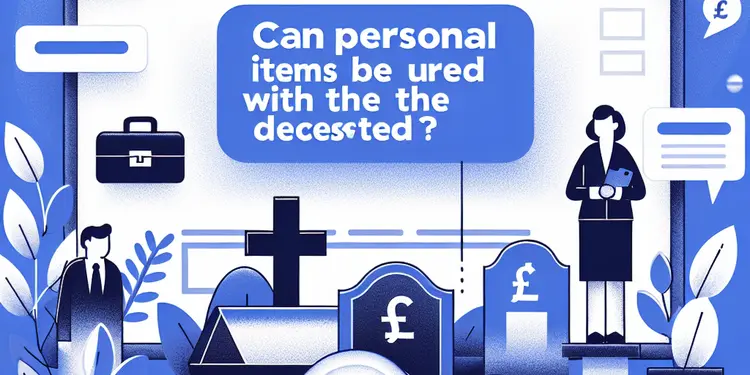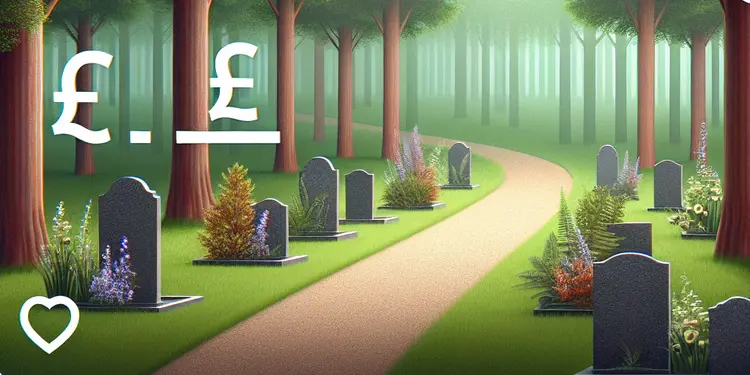
Find Help
More Items From Ergsy search
-

Can I bury a loved on on my own private property?
Relevance: 100%
-

Can personal items be buried with the deceased?
Relevance: 41%
-

How can families support a loved one with Alzheimer's?
Relevance: 38%
-
How can someone help a loved one with an eating disorder?
Relevance: 35%
-

What steps can I take to help an elderly loved one avoid scams?
Relevance: 31%
-

How can I support a loved one with dementia?
Relevance: 31%
-

Can anyone be buried in a woodland burial site?
Relevance: 29%
-

How does one initiate property litigation?
Relevance: 29%
-

Is there a difference in responsibility between public and private land?
Relevance: 29%
-

Can drink spiking occur in private settings?
Relevance: 25%
-
How can I support a loved one with dementia?
Relevance: 25%
-
How can I support a loved one with dementia?
Relevance: 25%
-

Do private hospitals have shorter waiting times for operations?
Relevance: 25%
-

Is there any relief available for CGT on property disposals?
Relevance: 25%
-

Can I use private dental services if I'm on the NHS list?
Relevance: 24%
-

Do I need to pay CGT if I gift a property?
Relevance: 24%
-

What is property litigation?
Relevance: 23%
-

Can my neighbour legally point a security camera at my property?
Relevance: 23%
-

What are the options for interring ashes?
Relevance: 23%
-

Can I offset losses from other properties when calculating my CGT?
Relevance: 22%
-

Which property sales are exempt from CGT?
Relevance: 22%
-

What are the different methods of burial available in the uk?
Relevance: 22%
-

Do neighbours need to inform me if their cameras record my property?
Relevance: 22%
-

How do I know if I need to pay CGT on my property disposal?
Relevance: 21%
-

Magistrates in the Family Court: A Private Law Case
Relevance: 21%
-

How can I reduce my CGT liability on a property sale?
Relevance: 21%
-

What tax rate applies to capital gains from property sales?
Relevance: 21%
-

Can water companies enter my property to enforce a hosepipe ban?
Relevance: 21%
-

Can private sellers offer the Plug-in Car Grant?
Relevance: 21%
-

How can one reduce the inheritance tax burden?
Relevance: 21%
-

Can property litigation be avoided?
Relevance: 21%
-

How do I report and pay Capital Gains Tax on property disposals?
Relevance: 20%
-

What are some common outcomes of property litigation?
Relevance: 20%
-

Are there specific forms required for reporting CGT on property disposals?
Relevance: 20%
-

What is receiving stolen property?
Relevance: 20%
-

Does the reform address uninhabitable properties?
Relevance: 20%
-

Are there new guidelines for property maintenance?
Relevance: 20%
-

Is it legal for my neighbor to have a security camera facing my property?
Relevance: 20%
-

What if my neighbor claims the camera is for security but it points towards my property?
Relevance: 20%
-

What properties are exempt from Stamp Duty?
Relevance: 20%
Can I Bury a Loved One on My Own Private Property in the UK?
Losing a loved one is a deeply personal experience, and for some, the thought of keeping them close by burying them on their own property is comforting. In the United Kingdom, understanding the legal and environmental ramifications of such a decision is crucial before proceeding.
Legal Considerations
In the UK, it is legally possible to bury a loved one on private property, but there are essential regulations and steps to adhere to. Firstly, you must obtain permission from the local council. The council will evaluate the environmental impact and ensure that the burial site is appropriate and safe. You also need to check whether there are any restrictive covenants on your property deed that could prohibit burials.
It's important to ensure that the burial does not pose a risk to public health. The burial site should not be close to water sources or susceptible to flooding. Additionally, you must record the burial in the property’s deeds to inform future owners of the land. It is advisable to consult with a solicitor or legal expert to navigate these requirements correctly.
Environmental and Health Impact
Environmental factors play a significant role in the decision to bury someone on private property. It's essential to consider the proximity to water sources, such as wells or streams, as decomposing bodies can potentially contaminate water supplies. To protect public health, the burial spot should be at least 50 meters away from any water source.
Additionally, if you live in an area prone to flooding, it may not be suitable for burial. The soil type and density should support safe decomposition; therefore, testing the soil might be necessary. Engaging with an environmental expert can help determine the suitability of your land for burial purposes.
Emotional and Practical Considerations
Burying a loved one on private property has emotional benefits, offering closeness and private mourning. However, there are practical issues to consider, including resale implications. Future owners of the property may not want a burial site on their piece of land, which might also affect the property's market value.
Additionally, consider the long-term care of the burial site including its maintenance and legal responsibilities. Having these details worked out ahead of time can prevent future disputes and ease the burden on family members.
Conclusion
While it is possible to bury a loved one on private property in the UK, it involves navigating various legal and environmental requirements. Consult with local authorities and legal experts to ensure compliance with the appropriate regulations. Carefully consider the long-term emotional and practical implications before proceeding with this deeply personal decision.
Can I Bury Someone I Love on My Own Land in the UK?
When we lose someone we love, we may want to keep them close. Some people think about burying them on their own land. In the UK, you need to know the rules and how it affects nature before you do this.
Rules You Need to Know
In the UK, you can bury someone on your land, but there are rules to follow. First, you need to ask your local council for permission. They will check if the burial is safe for the environment. You also need to make sure your property papers do not have rules that stop burials.
You must make sure the burial is safe for people's health. It should not be near water, like lakes or rivers, or in a place that floods easily. You must write down the burial in the property's papers so future owners know about it. It's a good idea to ask a lawyer to help with this.
Environment and Health
The place you choose should be safe for nature. It should be more than 50 meters away from any water, like wells or streams, to keep the water clean. If your land floods, it might not be good for a burial. The ground must be good for this too, so you might have to test it. Ask an environmental expert to check if your land is okay for a burial.
Feelings and Practical Things
Burying someone you love on your land can help you feel close to them. But, there are other things to think about. When you want to sell the land, new buyers might not like having a burial site there. This could change how much the land is worth.
You also need to think about taking care of the burial site, like keeping it tidy. Planning these things in advance can help your family later.
Final Thoughts
You can bury a loved one on your land in the UK, but you have to follow rules for the law and the environment. Talk to local authorities and experts to make sure you do it right. Think about all the long-term effects before making this personal choice.
Frequently Asked Questions
Can I bury a loved one on my own private property in the UK?
Yes, you can bury a loved one on your private property in the UK, but there are specific regulations and guidelines you must follow.
What legal requirements must be met to bury someone on private land in the UK?
You must have the landowner's permission, ensure the burial is recorded, and notify the Environment Agency if the burial poses any risk to water sources.
Do I need planning permission to bury a body on private land?
Usually, planning permission is not required for a single burial on private land, but it is advised to check with the local planning authority.
Are there any restrictions on where the grave can be located?
Yes, the grave should be at least 30 meters away from any water sources and 10 meters from any standing water or field drains.
How deep should a grave be on private property?
The gravesite should be deep enough to have at least one meter of soil covering the coffin or body.
Do I need to hire a professional to dig the grave?
It is not legally required to hire a professional, but it might be beneficial to ensure the grave is dug to the correct specifications.
Is it necessary to register or record the burial on private land?
Yes, it is important to keep a detailed record of the burial, including the date, time, and specific location on the property.
Can I mark the grave with a headstone or marker?
Yes, you can mark the grave with a headstone or marker, but it should not breach any local property covenants or planning restrictions.
What environmental considerations should be taken into account?
Consider the impact on local ecosystems, and ensure the burial site is environmentally safe and does not contaminate water sources.
Is a death certificate required for burial on private property?
Yes, a death certificate is required to legally bury someone, irrespective of the burial location.
Can pets or animals be buried alongside humans on private property?
Generally, it's not recommended to bury pets alongside humans due to various health and legal implications.
Do I need to inform neighbors if I plan to bury someone on my land?
While not legally required, it may be courteous to inform neighbors to avoid any future disputes or misunderstandings.
Can I exhume the body later if I need to move?
Exhumation requires a license, which is only granted in specific circumstances, so it is vital to consider the decision carefully.
What happens if the property is sold in the future?
Burials can impact property value and saleability; future owners must be informed and should agree to the conditions of the burial site.
Are there any religious considerations for burials on private land?
Depending on the deceased's religion, certain rites or ceremonies may need to be observed in accordance with religious beliefs as well as legal requirements.
Can I bury someone I love at home in the UK?
In the UK, you might be able to bury a loved one on your own land. Here are some things to think about:
- Check the rules: Ask your local council if it's okay.
- Location: Make sure the spot is not too close to water like rivers or lakes.
- Distance: Keep it away from houses and roads.
- Plan carefully: Get help from experts who know about this.
Talking to a funeral director or a lawyer can help. They know the rules and can give you good advice.
Yes, you can bury someone you love in your own garden in the UK. But there are rules you must follow.
What rules must be followed to bury a person in a garden in the UK?
If you want to bury someone in a garden, there are some important rules to follow:
- Check if the local council allows it. You might need to ask for permission.
- Make sure to tell the person who owns the land.
- Check if the land is safe for a burial. It should not be near water like rivers or wells.
- Tell the Land Registry about the burial. This is important for official records.
- Keep a map of where the person is buried.
If you need help, ask a friend or use support tools like pictures or easy-to-read guides.
You need to ask the landowner if it's okay to bury someone on their land. You should also write down that the burial happened. If the burial might make water dirty, you must tell the Environment Agency.
Can I bury a body in my yard without asking for permission?
Most of the time, you don't need special permission to bury someone on your own land. But it's a good idea to ask your local planning office just to be sure.
Can we choose any place for the grave?
When you are choosing a place for a grave, there might be rules about where you can put it. It is important to check with the cemetery or local council to know these rules. They can help you find the right place.
Yes, the grave should be at least 30 meters from any water sources and 10 meters from any standing water or field drains.
How deep should you dig a grave on your land?
When you dig a grave on your land, it needs to be deep enough. The grave should be about 4 feet deep. This helps keep the grave safe.
If you need help measuring, you can use a measuring tape. You can also ask someone to help you dig.
The grave should be dug deep. There needs to be at least one meter of dirt on top of the coffin or body.
Do I need to pay someone to dig the grave?
If you need to dig a grave, you might wonder if you should pay someone to do it.
Here are some things to think about:
- Digging a grave is hard work and takes special tools.
- It might be better to have a person who knows how to do it safely.
- Ask at the cemetery if they can help or recommend someone.
You can use pictures or videos to understand the process better.
You do not have to hire a professional to dig a grave, but it might be a good idea. A professional can make sure the grave is dug the right way.
Do you need to tell someone if you bury someone on your land?
Yes, it is important to write down details about the burial. This means you should note the date, time, and exact place where it happens on your property.
Can I put a sign on the grave?
Yes, you can put a sign on a grave to show who is buried there. The sign can be a stone or a marker.
To help understand better, you can:
- Ask someone you trust to read it with you.
- Look at pictures of headstones or markers to know what they are.
Yes, you can put a headstone or marker on the grave. But make sure you follow the local rules and permissions.
What should we think about for the environment?
Think about how the place affects nature around it. Make sure the burial place is safe for the environment and does not make water dirty.
Do you need a death certificate to bury someone on your own land?
Yes, you need a death certificate to bury someone. It does not matter where the burial happens.
Can pets or animals be buried with people in their yard?
Here are some things to think about:
- Check local rules: Some places have rules about burying pets and people in the same yard.
- Ask an expert: You can talk to a lawyer or someone who knows the rules to help you.
- Special areas: Some special places allow pets to be with people after they die. You can look for these places.
- Tools to help: You can use pictures or easy-reading tips to help understand if this is allowed in your area.
It's usually not a good idea to bury pets with people. This can cause health problems and there are also rules against it.
Should I tell my neighbors if I want to bury someone in my yard?
Yes, it's a good idea to let your neighbors know. It's polite and helps avoid surprises.
Here are some ways to tell them:
- Talk to them in person.
- Write them a simple note.
- Give them a phone call.
If you need help to do this, you can ask a friend or family member to help you talk to your neighbors.
Remember, telling your neighbors makes sure everyone gets along.
It can be a kind idea to tell your neighbors about the driveway project. This can help stop any problems or confusion later.
Can I move a body if I have to?
Digging up a body from a grave needs special permission. You only get this permission in certain cases. It is very important to think carefully before deciding to do this.
What if the house is sold later?
Having a burial on a property can change how much the property is worth and how easy it is to sell. Future owners of the property need to know about the burial and must agree to the rules there.
Do religions have rules for burying people on private land?
Different religions have special rules when someone dies. Some people have ceremonies or things they need to do because of their religion. There are also rules that everyone has to follow by law.
Useful Links
This website offers general information and is not a substitute for professional advice.
Always seek guidance from qualified professionals.
If you have any medical concerns or need urgent help, contact a healthcare professional or emergency services immediately.
Some of this content was generated with AI assistance. We’ve done our best to keep it accurate, helpful, and human-friendly.
- Ergsy carfully checks the information in the videos we provide here.
- Videos shown by Youtube after a video has completed, have NOT been reviewed by ERGSY.
- To view, click the arrow in centre of video.
- Most of the videos you find here will have subtitles and/or closed captions available.
- You may need to turn these on, and choose your preferred language.
- Go to the video you'd like to watch.
- If closed captions (CC) are available, settings will be visible on the bottom right of the video player.
- To turn on Captions, click settings .
- To turn off Captions, click settings again.
More Items From Ergsy search
-

Can I bury a loved on on my own private property?
Relevance: 100%
-

Can personal items be buried with the deceased?
Relevance: 41%
-

How can families support a loved one with Alzheimer's?
Relevance: 38%
-
How can someone help a loved one with an eating disorder?
Relevance: 35%
-

What steps can I take to help an elderly loved one avoid scams?
Relevance: 31%
-

How can I support a loved one with dementia?
Relevance: 31%
-

Can anyone be buried in a woodland burial site?
Relevance: 29%
-

How does one initiate property litigation?
Relevance: 29%
-

Is there a difference in responsibility between public and private land?
Relevance: 29%
-

Can drink spiking occur in private settings?
Relevance: 25%
-
How can I support a loved one with dementia?
Relevance: 25%
-
How can I support a loved one with dementia?
Relevance: 25%
-

Do private hospitals have shorter waiting times for operations?
Relevance: 25%
-

Is there any relief available for CGT on property disposals?
Relevance: 25%
-

Can I use private dental services if I'm on the NHS list?
Relevance: 24%
-

Do I need to pay CGT if I gift a property?
Relevance: 24%
-

What is property litigation?
Relevance: 23%
-

Can my neighbour legally point a security camera at my property?
Relevance: 23%
-

What are the options for interring ashes?
Relevance: 23%
-

Can I offset losses from other properties when calculating my CGT?
Relevance: 22%
-

Which property sales are exempt from CGT?
Relevance: 22%
-

What are the different methods of burial available in the uk?
Relevance: 22%
-

Do neighbours need to inform me if their cameras record my property?
Relevance: 22%
-

How do I know if I need to pay CGT on my property disposal?
Relevance: 21%
-

Magistrates in the Family Court: A Private Law Case
Relevance: 21%
-

How can I reduce my CGT liability on a property sale?
Relevance: 21%
-

What tax rate applies to capital gains from property sales?
Relevance: 21%
-

Can water companies enter my property to enforce a hosepipe ban?
Relevance: 21%
-

Can private sellers offer the Plug-in Car Grant?
Relevance: 21%
-

How can one reduce the inheritance tax burden?
Relevance: 21%
-

Can property litigation be avoided?
Relevance: 21%
-

How do I report and pay Capital Gains Tax on property disposals?
Relevance: 20%
-

What are some common outcomes of property litigation?
Relevance: 20%
-

Are there specific forms required for reporting CGT on property disposals?
Relevance: 20%
-

What is receiving stolen property?
Relevance: 20%
-

Does the reform address uninhabitable properties?
Relevance: 20%
-

Are there new guidelines for property maintenance?
Relevance: 20%
-

Is it legal for my neighbor to have a security camera facing my property?
Relevance: 20%
-

What if my neighbor claims the camera is for security but it points towards my property?
Relevance: 20%
-

What properties are exempt from Stamp Duty?
Relevance: 20%


